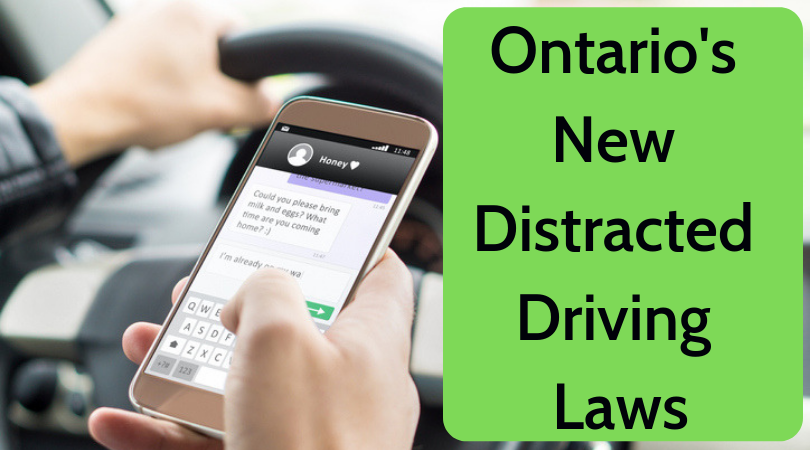You are driving along and you glance down at your smartwatch. Imagine the horror of it when you hear the sirens wail directly afterward — but you think that can’t be for you: you were not driving over the speed limit. But it can be for you. The police saw you glance at your smartphone, and now you are facing potential license suspension.
It’s here: stricter distracted driving rules in Ontario have the potential to be quite devastating. Here’s what you should know about the new law that took effect on January 1, 2019.
What is the new distracted driving law in Ontario?
The new distracted driving law in Ontario is not necessarily new in the sense of what is considered distracted driving, but new in terms of beefed up penalties. If an officer suspects that you are driving while distracted, then you can be pulled over and cited. The police, however, cannot seize your driver’s license on the roadside. Your case will go before a judge, and upon conviction, you will have your license suspended as well as be subject to fines and demerit points.
What actions are considered distractions according to the new law in Ontario?
When we think of distractions associated with a distracted driving law, we most often think of our smartphones, but there are many other distractions that can result in a conviction. In fact, anything that causes a driver to be less focused on the road is a distraction to driving. The list of distractions according to Ontario’s Ministry of Transportation include the following activities:
Holding an electronic device — like a smartphone, iPad, tablet, iPod, or another device;
Using an electronic device to text, talk, send posts on social media outlets, type in addresses into the GPS or look at maps or control playlists;
Eating; and/or
Reading books or documents.
Further, if you think you can be safe using your electronics at a traffic light or any other time while in stopped traffic, you are wrong. It is not permitted according to this law to use your electronic devices while stopped. You can, however, use the following:
A hands-free electronic device that utilizes technology like Bluetooth and requires you to only turn it on or off; or
A mounted electronic device — whether it’s a phone or GPS system — so long as it is secure and does not move while you are driving.
The only exception to the new law is if you need to contact emergency personnel, like the police, fire department, or medical professionals.
What are the new penalties for distracted driving in Ontario?
Distracted driving has already been an offense in Ontario, but the new law strengthens the penalties to make it more of a deterrent than what it had been. Penalties vary according to the conviction: whether or not you have any prior distracted driving offenses. Plus, aside from the penalties, you can expect your auto insurance rates to increase dramatically. The stakes, therefore, have just multiplied with this new law.
First Distracted Driving Conviction Penalties
For a first distracted driving offense, you can expect the following penalties:
A fine of up to $1,000
Three (3) demerit points
A three (3) day driver’s license suspension, unless you have a graduated license, like a G1- or G2, then the license suspension is for 30 days.
Second Distracted Driving Conviction Penalties
For a second distracted driving offense within five years, you can expect the penalties to double:
A fine of up to $2,000
Six (6) demerit points
A seven (7) day license suspension, unless you are a G1- or G2-license holder, then the license suspension is for 90 days.
Third Distracted Driving Conviction Penalties
For a third distracted driving offense within five years, the penalties increase progressively, and include:
A fine of up to $3,000
Six (6) demerit points
A thirty (30) day driver’s license suspension, unless you are a G1- or G2-license holder, then your license could be canceled — and it can be difficult to get the license back.
Subsequent Distracted Driving Conviction Penalties
For each new conviction, fines and driver’s license suspension increases. You could potentially — if you become a repeat offender — be looking at driver’s license suspension up to two (2) years and fines of up to $50,000.
What to Do When Driving on the Roads in Ontario
There is a reason behind the new law and that is safety. The following are some statistics provided by CAA that you should keep in mind:
“Drivers engaged in visual-manual interactions with cell phones (e.g., texting) are up to eight times as likely to be involved in a crash.” (AAA, 2017)
Twenty-seven percent “of fatal crashes in BC was due to distraction. Police across Canada say that distracted driving has caused more collisions than impaired drivers.” (ICBC, 2016)
Thirty-three percent “of Canadians admit they have texted while stopped at a red light, despite believing it is unacceptable.” (CAA, 2016)
These are serious statistics. The obvious way to prevent the above from happening and from you obtaining a distracted driving citation and subsequent conviction in Ontario is simple: don’t use your electronic devices while driving, but also, don’t eat, read, or write, or even groom yourself by putting on makeup or brushing your hair. Refraining from these activities can help bring down the above statistics and can help make our roads safer.
